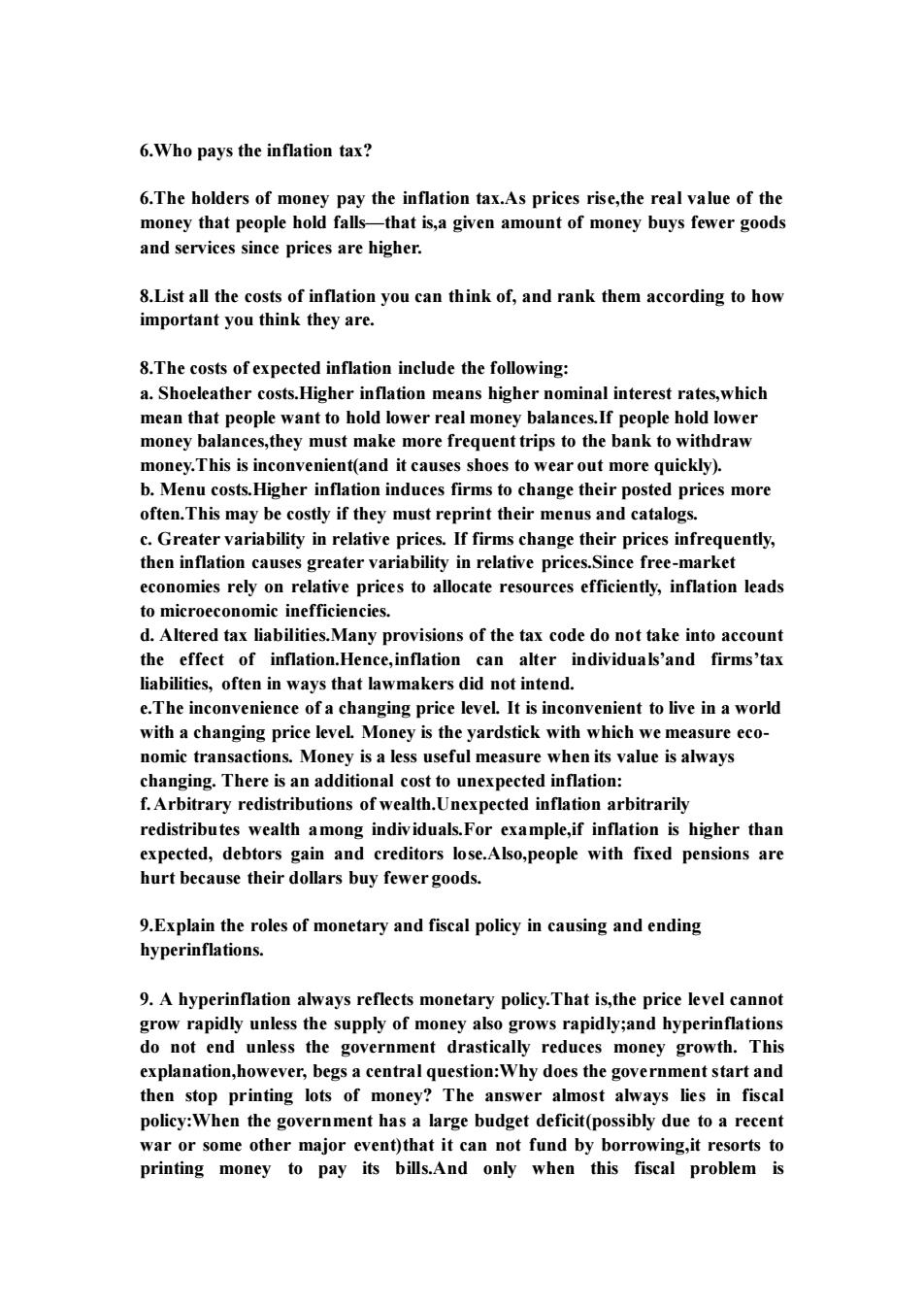正在加载图片...

6.Who pays the inflation tax? 6.The holders of money pay the inflation tax.As prices rise,the real value of the money that people hold falls-that is,a given amount of money buys fewer goods and services since prices are higher. 8.List all the costs of inflation you can think of,and rank them according to how important you think they are. 8.The costs of expected inflation include the following: mean that people want to money balances,they must make more frequent trips to the bank to withdraw money.This is inconvenient(and it causes shoes to wear out more quickly). b.Menu costs.Higher inflation induces firms to change their posted prices more often.This may be costly if they must reprint their menus and catalogs. c.Grea variability in relative s.If firms chan theirprices the tion causes greater prices.Since fre-marker economies rely on relative prices to allocate resources efficiently,inflation leads to microeconomic inefficiencies. d.Altered tax liabilities.Many provisions of the tax code do not take into account the effect of inflation.Hence,inflation can alter individuals'and firms'tax liabilities,ofe in ways that a s did notir e.The inconvenience of a changing price level.It is inconvenient to live in a world with a changing price level.Money is the yardstick with which we measure eco- nomic transactions.Money is a less useful measure when its value is always han rary redistributions of wealth.Unexpected inflatior redistributes wealth among individuals.For example,if inflation is higher than expected,debtors gain and creditors lose.Also,people with fixed pensions are hurt because their dollars buy fewer goods. 9.Explain the roles of monetary and fiscal policy in causing and ending hyperinflations 9.A hyperinflation always reflects monetary policy.That is,the price level cannot grow rapidly unless the supply of money also grows rapidly;and hyperinflations do not end unless the money owth.This expla ion,h ver, central que tion:Why does the govern star then stop printing lots of money?The answer almost always lies in fiscal policy:When the government has a large budget deficit(possibly due to a recent war or some other major event)that it can not fund by borrowing,it resorts to printing money to pay its bills.And only when this fiscal problem is 6.Who pays the inflation tax? 6.The holders of money pay the inflation tax.As prices rise,the real value of the money that people hold falls—that is,a given amount of money buys fewer goods and services since prices are higher. 8.List all the costs of inflation you can think of, and rank them according to how important you think they are. 8.The costs of expected inflation include the following: a. Shoeleather costs.Higher inflation means higher nominal interest rates,which mean that people want to hold lower real money balances.If people hold lower money balances,they must make more frequent trips to the bank to withdraw money.This is inconvenient(and it causes shoes to wear out more quickly). b. Menu costs.Higher inflation induces firms to change their posted prices more often.This may be costly if they must reprint their menus and catalogs. c. Greater variability in relative prices. If firms change their prices infrequently, then inflation causes greater variability in relative prices.Since free-market economies rely on relative prices to allocate resources efficiently, inflation leads to microeconomic inefficiencies. d. Altered tax liabilities.Many provisions of the tax code do not take into account the effect of inflation.Hence,inflation can alter individuals’and firms’tax liabilities, often in ways that lawmakers did not intend. e.The inconvenience of a changing price level. It is inconvenient to live in a world with a changing price level. Money is the yardstick with which we measure economic transactions. Money is a less useful measure when its value is always changing. There is an additional cost to unexpected inflation: f.Arbitrary redistributions of wealth.Unexpected inflation arbitrarily redistributes wealth among individuals.For example,if inflation is higher than expected, debtors gain and creditors lose.Also,people with fixed pensions are hurt because their dollars buy fewer goods. 9.Explain the roles of monetary and fiscal policy in causing and ending hyperinflations. 9. A hyperinflation always reflects monetary policy.That is,the price level cannot grow rapidly unless the supply of money also grows rapidly;and hyperinflations do not end unless the government drastically reduces money growth. This explanation,however, begs a central question:Why does the government start and then stop printing lots of money? The answer almost always lies in fiscal policy:When the government has a large budget deficit(possibly due to a recent war or some other major event)that it can not fund by borrowing,it resorts to printing money to pay its bills.And only when this fiscal problem is